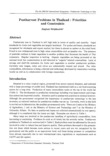Postharvest Problems in Thailand Priorities and Constraints
JIRCAS international symposium series
| ISSN | 13406108 |
|---|---|
| NII recode ID (NCID) | AA1100908X |

Full text
intlsymp-7_17-24.pdf218.08 KB
Postharvest loss in Thailand is still high both in terms of quality and quantity. Legal standards for fruits and vegetables are largely inexistent. For grains and beans, standards are recognized for wholesale and export market, but there is almost no system at the retail level. Fraud is now widespread even in high value commodities such as jasmine rice. The presence of pesticide residues in fresh vegetables is another problem that threatens the health of Thai consumers. Regular inspection is lacking. Organic vegetables are being promoted at the national level, but contamination is still detected in "organic"-labeled commodities. Lack of storage and shelf-life extension for fruits and vegetables is another postharvest problem. Currently only longan, onion and citrus are substantially treated and stored. For other commodities, information is being collected and technology developed by researchers working locally as well as in collaboration with foreign researchers.
| Creator | Jingtair Siriphanich |
|---|---|
| Publisher | Japan International Research Center for Agricultural Sciences |
| Available Online | |
| Issue | 7 |
| spage | 17 |
| epage | 24 |
| Language | eng |
